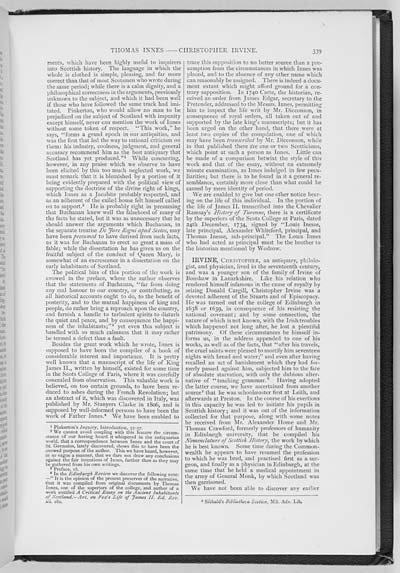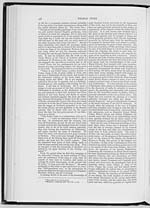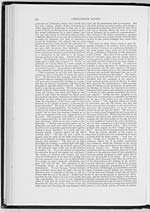339
ments, which have been highly useful to inquirers
into Scottish history. The language in which the
whole is clothed is simple, pleasing, and far more
correct than that of most Scotsmen who wrote during
the same period; while there is a calm dignity, and a
philosophical correctness in the arguments, previously
unknown to the subject, and which it had been well
if those who have followed the same track had imi-
tated. Pinkerton, who would allow no man to be
prejudiced on the subject of Scotland with impunity
except himself, never can mention the work of Innes
without some token of respect. "This work," he
says, "forms a grand epoch in our antiquities, and
was the first that led the way to rational criticism on
them: his industry, coolness, judgment, and general
accuracy recommend him as the best antiquary that
Scotland has yet produced."1 While concurring,
however, in any praise which we observe to have
been elicited by this too much neglected work, we
must remark that it is blemished by a portion of it
being evidently prepared with the political view of
supporting the doctrine of the divine right of kings,
which Innes as a Jacobite probably respected, and
as an adherent of the exiled house felt himself called
on to support.2 He is probably right in presuming
that Buchanan knew well the falsehood of many of
the facts he stated, but it was as unnecessary that he
should answer the arguments which Buchanan, in
the separate treatise De jure Regni apud Scotos, may
have been presumed to have derived from such facts,
as it was for Buchanan to erect so great a mass of
fable; while the dissertation he has given us on the
fruitful subject of the conduct of Queen Mary, is
somewhat of an excrescence in a dissertation on the
early inhabitants of Scotland.
The political bias of this portion of the work is
avowed in the preface, where the author observes
that the statements of Buchanan, "far from doing
any real honour to our country, or contributing, as
all historical accounts ought to do, to the benefit of
posterity, and to the mutual happiness of king and
people, do rather bring a reproach upon the country,
and furnish a handle to turbulent spirits to disturb
the quiet and peace, and by consequence the happi-
ness of the inhabitants;"3 yet even this subject is
handled with so much calmness that it may rather
be termed a defect than a fault.
Besides the great work which he wrote, Innes is
supposed to have been the compiler of a book of
considerable interest and importance. It is pretty
well known that a manuscript of the life of King
James II., written by himself, existed for some time
in the Scots College of Paris, where it was carefully
concealed from observation. This valuable work is
believed, on too certain grounds, to have been re-
duced to ashes during the French Revolution; but
an abstract of it, which was discovered in Italy, was
published by Mr. Stanyers Clarke in 1806, and is
supposed by well-informed persons to have been the
work of Father Innes.4 We have been enabled to
1 Pinkerton's Inquiry, Introduction, 35-57.
2 We cannot avoid coupling with this feature the circum-
stance of our having heard it whispered in the antiquarian
world, that a correspondence between Innes and the court of
St. Germains, lately discovered, shows this to have been the
avowed purpose of the author. This we have heard, however,
in so vague a manner, that we dare not draw any conclusions
against the fair intentions of Innes, farther than as they may
be gathered from his own writings.
3 Preface, 16.
* In the Edinburgh Review we discover the following note:
�" It is the opinion of the present preserver of the narrative,
that it was compiled from original documents by Thomas
Innes, one of the superiors of the college, and author of a
work entitled A Critical Essay on the Ancient Inhabitants
of Scotland.�Art. on Fox's Life of James II. Ed. Rev.
xii. 280.
trace this supposition to no better source than a pre-
sumption from the circumstances in which Innes was
placed, and to the absence of any other name which
can reasonably be assigned. There is indeed a docu-
ment extant which might afford ground for a con-
trary supposition. In 1740 Carte, the historian, re-
ceived an order from James Edgar, secretary to the
Pretender, addressed to the Messrs. Innes, permitting
him to inspect the life writ by Mr. Dicconson, in
consequence of royal orders, all taken out of and
supported by the late king's manuscripts; but it has
been urged on the other hand, that there were at
least two copies of the compilation, one of which
may have been transcribed by Mr. Dicconson, while
in that published there are one or two Scotticisms,
which point at such a person as Innes. Little can
be made of a comparison betwixt the style of this
work and that of the essay, without an extremely
minute examination, as Innes indulged in few pecu-
liarities; but there is to be found in it a general re-
semblance, certainly more close than what could be
caused by mere identity of period.
We are enabled to give but one other notice bear-
ing on the life of this individual. In the portion of
the life of James II. transcribed into the Chevalier
Ramsay's History of Turenne, there is a certificate
by the superiors of the Scots College at Paris, dated
24th December, 1734, signed by "Louis Inesse,
late principal, Alexander Whiteford, principal, and
Thomas Inesse, sub-principal." The Louis Innes
who had acted as principal must be the brother to
the historian mentioned by Wodrow.
IRVINE, CHRISTOPHER, an antiquary, philolo-
gist, and physician, lived in the seventeenth century,
and was a younger son of the family of Irvine of
Bonshaw in Lanarkshire. Like his relation who
rendered himself infamous in the cause of royalty by
seizing Donald Cargill, Christopher Irvine was a
devoted adherent of the Stuarts and of Episcopacy.
He was turned out of the college of Edinburgh in
1638 or 1639, in consequence of his resisting the
national covenant; and by some connection, the
nature of which is not known, with the Irish troubles
which happened not long after, he lost a plentiful
patrimony. Of these circumstances he himself in-
forms us, in the address appended to one of his
works, as well as of the facts, that "after his travels,
the cruel saints were pleased to mortify him seventeen
nights with bread and water;" and even after having
recalled an act of banishment which they had for-
merly passed against him, subjected him to the fate
of absolute starvation, with only the dubious alter-
native of "teaching grammar." Having adopted
the latter course, we have ascertained from another
source5 that he was schoolmaster first at Leith, and
afterwards at Preston. In the course of his exertions
in this capacity he was led to initiate his pupils in
Scottish history ; and it was out of the information
collected for that purpose, along with some notes
he received from Mr. Alexander Home and Mr.
Thomas Crawford, formerly professors of humanity
in Edinburgh university, that he compiled his
Nomenclature of Scottish History, the work by which
he is best known. Some time during the Common-
wealth he appears to have resumed the profession
to which he was bred, and practised first as a sur-
geon, and finally as a physician in Edinburgh, at the
same time that he held a medical appointment in
the army of General Monk, by which Scotland was
then garrisoned.
We have not been able to discover any earlier
5 Sibbald's Bibliotheca Scotica, MS. Adv. Lib.

![]() Universal Viewer |
Universal Viewer | ![]() Mirador |
Large image | Transcription
Mirador |
Large image | Transcription
![]()

